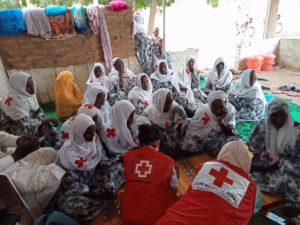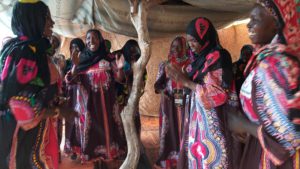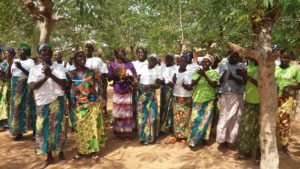
Susana Pales
Description
The Mothers’ Club (MC) is a holistic approach that promotes women’s empowerment and resilience (and that of their households and communities). The approach is based on three components: a savings and credit component that allows MC members to save and access small credits to develop their income-generating activities or solidarity credits (in case of illness); a community awareness-raising component where women are trained and sensitised on issues of interest for the community (health, wash, nutrition, climate change, etc.); and a third component (optional) of developing a collective income-generating activity.
Mothers’ Clubs have their roots in Ghana, furthermore, this approach was developed particularly by the Togolese Red Cross, to create social cohesion between Ghanaian refugees and host communities, to promote best practices in WASH, nutrition and health and to foster economic insertion. Since 1996, the approach has spread mainly in the African region (Chad 2013, Niger 2019, Mauritania 2020-2021, Sierra Leone, Cameroon, etc.), but also to other continents (Haiti, 2021).
The IFRC Livelihoods Resource Center (LRC), hosted by the Spanish Red Cross, since 2017 and together with other Red Cross Red Crescent partners, is promoting the approach and creating resources and training to facilitate its implementation.
Context
The Mothers’ Clubs (MC) approach responds to several types of needs at the same time. This approach is made up of three components: 1) the contribution to a savings and credit funds (or IGA fund) and to the solidarity and health fund; 2) the community awareness-raising component and 3) the (non-compulsory) component of reinforcement through collective IGAs, that effectively responds to the needs of:
- Economic emancipation of women. Mothers’ club members, through the savings and loan component have the possibility of accessing credit (at low or no interest) to develop income-generating activities.
- Health and solidarity support. Women have access to funds (with no interest) in the event of illness of themselves or their children, through the solidarity and health funds.
- Create networks of support and solidarity
- To have spaces for exchange where aspects of common interest to them (among women) can be discussed, both for the members of the Mothers’ Clubs and for the rest of the women in the community
- Social cohesion
- Capacity strengthening and building through the training and the support Mother’s club members receive on awareness-raising subjects (health, nutrition, hygiene promotion, climate change, etc.) or on economic aspects (Income-Generating Activities’ management, bookkeeping, etc.)
- Capacity strengthening and building for the community members on awareness-rising subjects (health, nutrition, hygiene promotion, etc.) contributing to the improvement of their living conditions (impacts onper reduction of malnutrition and hydric-based diseases, etc.)
All these elements, in turn, respond to the need to improve women’s self-esteem, their participation in decision-making at home and the improvement of their participation in the public (community) sphere; as well as to improve the living conditions of the community (health, nutrition, etc.).
Technical details & Operations
A Mothers’ Club is an association of volunteer women (20 to 30 normally) who adhere to the Red Cross principles, and come together to discuss among themselves and with other members of the community about topics they have previously been trained on such as maternal and child health, WASH, nutrition, etc.
The creation of the Mothers’ Clubs starts with a community meeting, in which Red Cross | Red Crescent volunteers present the approach to the community, because it is necessary that Mothers’ Clubs be created from the voluntary participation of their members. Once the women join the Club, they are trained in their approach, as well as in knowledge about associative life, conflict management, or the principles of CR/CR, among others.
In the first few weeks after creation, is when the two main components are launched:
- The training on the topics for the awareness-rising (child care, health, nutrition, etc.) as well as on communication to learn how to transmit the key messages to the community.
- The start of contributions to savings and loans funds (or IGA fund) and to the solidarity and health fund.
Women are provided with the tools and equipment they need to start their activities.
Although the two activities start in the early stages of the project, it is important to be able to ensure a significant amount of time for accompaniment both for the awareness-raising sessions and for the saving & loans components. It is important to train teams and volunteers to ensure accompaniment and support in this process, so that women are autonomous to:
- Carry out awareness-raising activities (door-to-door or in groups), but also decide and plan them (set dates, organise between them, choose and communicate the activity, etc.).
- Manage, autonomously, the tracking of contributions, the initiation of loans and the follow-up of refunds, while using the registration tools.
- Manage the group: decision making, transparency, conflict management, etc.
After six months (or so), one may consider starting with the third component: the creation of the collective income-generating activity. It is important that this activity begins when the group is already functioning and begins to be autonomous.
The Mothers’ Club is a holistic and very versatile approach that can be combined with other types of activities, especially at the community level, as its members facilitate the transmission of messages and promote behaviour change in the community. This is mainly done through training on new topics such as climate change and environmental management, gender-based violence, etc., together with specific actions that reinforce awareness-raising activities (e.g., planting trees, creating listening points and referral mechanism with relevant partners, etc.). It can also be combined with actions aimed at the women members of the MCs (literacy, digital literacy, coaching in the management of individual IGA, etc.), according to the objectives of the project.
The MC’s approach is strongly documented and has many resources available, developed by the Livelihoods Resource Center, to support its implementation, such as:
- Guide, Leaflet, Evaluation: Approche intégrée du Club des Mères – Livelihoods Centre
- Trainings (face to face training): Formation LRC – Livelihoods Centre
- Toolkit: MC-SCG Toolkit – Livelihoods Centre (cruzroja.es)
- Livelihoods Resource Center: Home – Livelihoods Centre
Deployment & Impact
The activities of the Mothers’ Clubs have helped to strengthen social cohesion by encouraging dialogue between club members and within the community.
Mothers’ Clubs have an impact at different levels, both on their members and on the communities in which they are located: an impact on women’s economic autonomy, contributing to the improvement of household food and economic security; an impact on people’s living conditions thanks to awareness-raising activities (hygiene promotion, maternal and child health, nutrition, etc.) and a social impact.
The women’s groups, in their regular tasks as members of the Mothers’ Club, meet on a weekly or by-weekly basis; these meetings, besides serving to make contributions (savings and credit component) or to plan their community activities (awareness-raising and others), are a safe space for exchange, where they share problems, opinions and points of view about their day to day life.
Depending on the context in which the Mothers’ Clubs are set up, the meetings are the only space for exchange they have and it’s the main motivation for women to belong to mothers’ clubs.
In addition to the possibility of exchanging with each other and becoming a support network, the role they play through the community awareness-raising component enhances and increases their participation in the community.
In the evaluation carried out in Chad, this fact was highlighted by the women who mentioned that Mothers’ Clubs helped to build a “social network” which has clearly contributed to women’s resilience through initiatives of solidarity, listening and mutual help in times of need, as well as an increase in self-esteem.
The evaluation also showed that the activities of the Mothers’ Clubs are a source of pride for the women involved and have enabled them to gain confidence, both at home (where their participation in decision-making increases) and in the public sphere. Some people, previously shy, have acquired the habit of expressing themselves in public, which has enabled them to strengthen their commitment by increasing their participation in events and activities within their community (weddings, baptisms, deaths, neighbourhood meetings).
“The clubs receive invitations to social events and sometimes help to organise them, which tends to increase their recognition by the rest of the community.”
“Thanks to the group, the women have a lot more contact with each other than before, the MCs have encouraged exchanges and sharing between the women, not only the members but also the other women who take part in the awareness-raising sessions”. Loubina, Batha Village chief








